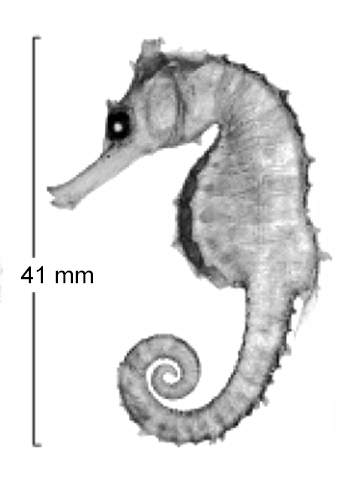| Syngnathidae (Pipefishes and seahorses), subfamily: Syngnathinae |
| 7.8 cm OT (female) |
|
pelagic-neritic; marine, non-migratory |
| Eastern Indian Ocean: known only from Monte Bello Islands and Exmouth Gulf, Western Australia. |
|
Dorsal spines (total): 0-0; Dorsal soft rays (total): 18-19. Trunk rings 11; tail rings 37; subdorsal spines 3/0,1,0; spine above eye of moderate size, length about pupil-diameter, slightly angled back; moderately large and recurving lateral head spine; long, forward-directed nape spine; nose profile straight; coronet moderately high, with spines on corners, posterior 3 largest and directed backward; 3 spines of moderate size on shoulder ring, uppermost and central spines at end of pectoral-fin base, lowermost ventrally; superior trunk ridge with spines of small to moderate size on rings 1, 4, 7 and 11, extended by long dermal flaps at spine tips in holotype; superior tail ridge similar to superior trunk ridge, with enlarged spines at regular intervals, becoming progressively smaller posteriorly (Ref. 42735). |
| Found on the continental shelf (Ref. 75154). Holotype caught at the surface, clinging to Sargassum fragment (Ref. 42735). Maximum length is based on a straight-line length measurement from upper surface (ignoring spines) of first trunk ring, to tip of tail (Ref. 42735). Ovoviviparous (Ref. 205). The male carries the eggs in a brood pouch which is found under the tail (Ref. 205). |
|
Not Evaluated (N.E.) Ref. (130435)
|
| harmless |
Source and more info: www.fishbase.org. For personal, classroom, and other internal use only. Not for publication.

